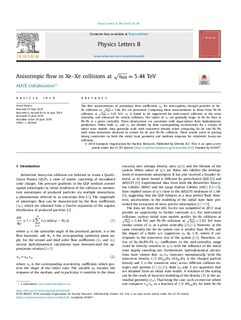Anisotropic flow in Xe–Xe collisions at √sNN = 5.44 TeV
Acharya, Shreyasi; Acosta, Fernando T.; Adamová, Dagmar; Adolfsson, Jonatan; Aggarwal, Madan M.; Aglieri Rinella, Gianluca; Agrawal, Nikita; Ahammed, Zubayer; Ahn, Sang Un; Aiola, Salvatore; Alme, Johan; Altenkaemper, Lucas; Djuvsland, Øystein; Ersdal, Magnus Rentsch; Fionda, Fiorella Maria Celeste; Nystrand, Joakim; Rehman, Attiq ur; Røhrich, Dieter; Tambave, Ganesh Jagannath; Ullaland, Kjetil; Wagner, Boris; Zhou, Zhuo; Arsene, Ionut Christian; Bätzing, Paul Christoph; Dordic, Olja; Lardeux, Antoine Xavier; Lindal, Svein; Mahmood, Sohail Musa; Malik, Qasim Waheed; Richter, Matthias Rudolph; Røed, Ketil; Skaali, Toralf Bernhard; Tveter, Trine Spedstad; Wikne, Jon Christopher; Zhao, Chengxin; Helstrup, Håvard; Hetland, Kristin Fanebust; Kileng, Bjarte; Nesbø, Simon Voigt; Storetvedt, Maksim Melnik; Langøy, Rune; Lien, Jørgen; Akindinov, Alexander; Al-Turany, Mohammed; Alam, Sk Noor; De Albuquerque, Danilo Silva; Aleksandrov, Dimitry; Alessandro, Bruno; Alfaro Molina, José Rubén; Ali, Yasir Turki Ben; ALICE, Collaboration
Journal article, Peer reviewed
Published version
Permanent lenke
http://hdl.handle.net/11250/2561924Utgivelsesdato
2018Metadata
Vis full innførselSamlinger
- Institutt for mikrosystemer [546]
- Publikasjoner fra CRIStin [3623]
Sammendrag
The first measurements of anisotropic flow coefficients vn for mid-rapidity charged particles in Xe–Xe collisions at √sNN = 5.44 TeV are presented. Comparing these measurements to hose from Pb–Pb collisions at √sNN = 5.02 TeV, v2 is found to be suppressed for mid-central collisions at the same centrality, and enhanced for central collisions. The values of v3 are enera lly larger in Xe –Xe than in Pb–Pb at a given centrality. These observations are consistent with expect ations from hydrodynamic predictions. When both v2 and v3 are divided by their corresponding eccentricities for a variety of initial state models, they gene rally scale with transverse density when comparing Xe –Xe and Pb–Pb, with some deviations observed in central Xe –Xe and Pb–Pb collisions. These results assist in placing strong constraints on both the initial state geometry and medium response for relativistic heavy-ion collisions.

